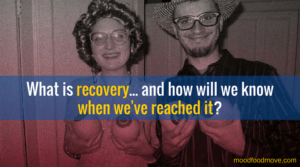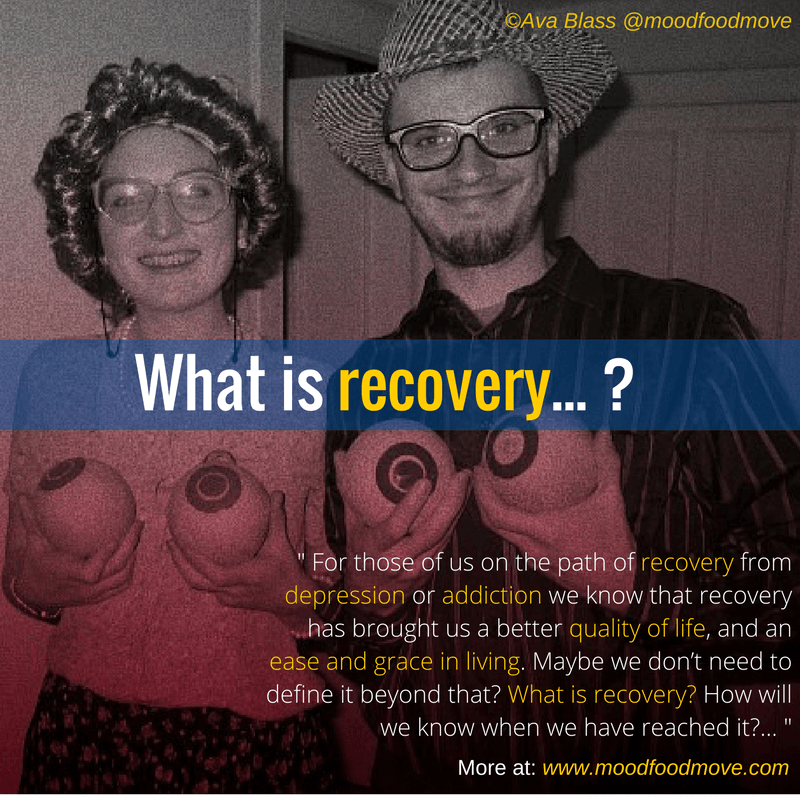 If you are on the path of recovery you’ll know it has brought you a better quality of life, and an easier way of living. So, perhaps you don’t need to define it beyond that? Nevertheless here we ask: What is recovery? How will we know when we have reached it?*
If you are on the path of recovery you’ll know it has brought you a better quality of life, and an easier way of living. So, perhaps you don’t need to define it beyond that? Nevertheless here we ask: What is recovery? How will we know when we have reached it?*
How clinicians define Recovery…
Let’s begin with how clinicians define recovery. Professionals who work with clients with addiction and depression need operational definitions to help them evaluate treatments. These definitions are deliberately nebulous and vague, because recovery is an intensely personal experience that is hard to categorize. For addiction, the NAADAC suggests:
“Recovery is a voluntarily maintained lifestyle characterized by sobriety, personal health, and citizenship.
Depression recovery is defined quite differently, with its focus being on symptoms falling below the threshold previously used for defining onset. From the Psychiatric Times depression recovery is:
“The absence of symptoms for at least 4 months following the onset of remission.
How about a definition of Recovery for us…
What about us – the former addict/depressed person – what might be an functional definition of recovery that we could use? The one which I use for myself comes from a distinguished figure in the addiction field, Dr Gabor Mate:
“Recovery is a journey back to who you naturally are.
This definition resonates beautifully with me. It is not reliant on what you do, but on who you are. It doesn’t focus on the changes in our behavior, lifestyle or mindset – these would be the landmarks that clinicians are looking for. Instead the changes which we observe in ourselves, are our old skins gradually shedding to reveal the authentic self beneath.
The real you is hidden beneath the layers of addiction and depression
Recovery is a journey to your authentic self, to the real you. It’s a time of personal growth and transformation, when you untangle yourself from the addiction and depression – and in so doing allow the person beneath all the bullshit to be revealed.
Addiction is a protective skin – it protects us from experiencing the pain beneath. The way it protects us is via avoidance – through its rituals and promises of escape. Neuroscientist and former addict, Marc Lewis PhD, explains that addiction is our misguided way of self-medicating against the pain in our lives. As our addictive behaviors and thinking recede during the recovery journey, the uncomfortable feelings you were avoiding can now percolate up, unimpeded. Without addiction you are now exposed to the raw pain of the depression you were avoiding.
Depression, like addiction, similarly distorts how we think and behave – and doesn’t reflect who we really are. Neither the addicted personality nor the depressed personality are our true selves. They are the twisted roles we perform, and the personas we project. You don’t know it, when you first embark on your recovery journey, but hidden beneath the layers of addiction and psychological pain is You. The real you, your authentic self.
Self-knowledge evolves as a result of undergoing derailments
So, how is the real you – your authentic self – revealed during recovery? It occurs through traversing the rugged terrain of the recovery journey. Recovery is a convoluted journey which loops back onto itself, taking you back over the same territory many times. Let me first share this quote by former booze-hound, Mishka Shubaly:
“The only way to succeed is to fail… over & over & over again. Just get right in your head with failing; that’s how you succeed.
Mishka’s “failing over & over” is relevant here because it elegantly describes the progression along the path of recovery. Recovery is a succession of failures, of mistakes, of wrong turns, of bad decisions, of bad choices. Over and over. But, this isn’t the disaster it sounds to be, because if we persist along the recovery path our self-knowledge evolves as a result of undergoing all these derailments. And that’s the message within Mishka’s comment – success comes from failing again and again. Success in recovery comes as we learn from the failures, mistakes, bad choices, etc.: we learn about ourselves. Self-knowledge and self-revelation are the reward, the way to succeed.
How will you know when you get there?
There is no destination for recovery. Recovery is the journey you will take for the rest of your life toward self-knowledge, self-acceptance, self-understanding. You will find the ability to accept your own flaws with the same equanimity you’ll accept your strengths. You’ll see that both are part of you, and that both are ‘OK’. It’s a journey where you will discover self-love. Being told this early in recovery will make an addict wince. To consider yourself to be deserving of love, to be lovable, and to love yourself would be cringe-inducing. That is because think you know The Terrible Secret: that you are a bad person, unlovable, who doesn’t deserve love. You’ll find though that that was just the distorted voices of addiction and depression speaking.
The journey of recovery will reveal the real you, to yourself – as a person who loves, and is loved – by you, and by others. That is the greatest gift of all… the ability to love yourself. If there were a destination for recovery, it would be self-love.
So perhaps the answer to the question “what is recovery” is: self-love.
Take good care of yourself,
Ava 🙂
*This article was written when moodfoodmove’s focus was people affected by depression and addiction. Whilst we very much still care about this group, our advice re taking better care of yourself (via good nutrition, healthy lifestyle and a positive mindset) applies equally to all of us. We ALL need to take better care of ourselves.

